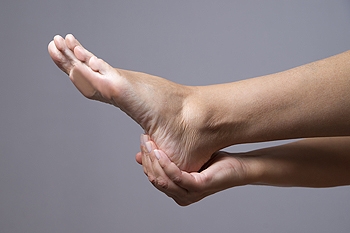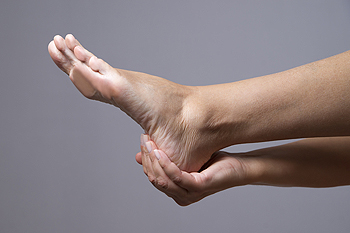
 The majority of warts can be unsightly and painful, and a plantar wart is no exception. This type of wart develops on the heel of the foot and will grow inward as a result of the pressure the feet endures on a daily basis. It is known to be caused by the human papillomavirus, which is also referred to as HPV, and may be more prevalent in children and people who have compromised immune systems. This contagious virus can be transmitted by direct contact with a person who may carry the germ or from an object that may have been contaminated. Some of the symptoms that might be associated with plantar warts may include a small area that may be rough in texture on the heel of the foot. Additionally, there may be tiny black dots in the center of the wart, and you may experience pain while walking or standing. If you are afflicted with plantar warts, it’s suggested to speak with a podiatrist who can offer correct treatment options that may include removal of the wart.
The majority of warts can be unsightly and painful, and a plantar wart is no exception. This type of wart develops on the heel of the foot and will grow inward as a result of the pressure the feet endures on a daily basis. It is known to be caused by the human papillomavirus, which is also referred to as HPV, and may be more prevalent in children and people who have compromised immune systems. This contagious virus can be transmitted by direct contact with a person who may carry the germ or from an object that may have been contaminated. Some of the symptoms that might be associated with plantar warts may include a small area that may be rough in texture on the heel of the foot. Additionally, there may be tiny black dots in the center of the wart, and you may experience pain while walking or standing. If you are afflicted with plantar warts, it’s suggested to speak with a podiatrist who can offer correct treatment options that may include removal of the wart.
Plantar warts can be very uncomfortable. If you need your feet checked, contact Dr.Eji Shobowale from DeNiel Foot & Ankle Center. Our doctor will assist you with all of your foot and ankle needs.
About Plantar Warts
Plantar warts are the result of HPV, or human papillomavirus, getting into open wounds on the feet. They are mostly found on the heels or balls of the feet.
While plantar warts are generally harmless, those experiencing excessive pain or those suffering from diabetes or a compromised immune system require immediate medical care. Plantar warts are easily diagnosed, usually through scraping off a bit of rough skin or by getting a biopsy.
Symptoms
- Lesions on the bottom of your feet, usually rough and grainy
- Hard or thick callused spots
- Wart seeds, which are small clotted blood vessels that look like little black spots
- Pain, discomfort, or tenderness of your feet when walking or standing
Treatment
- Freezing
- Electric tool removal
- Laser Treatment
- Topical Creams (prescription only)
- Over-the-counter medications
To help prevent developing plantar warts, avoid walking barefoot over abrasive surfaces that can cause cuts or wounds for HPV to get into. Avoiding direct contact with other warts, as well as not picking or rubbing existing warts, can help prevent the further spread of plantar warts. However, if you think you have developed plantar warts, speak to your podiatrist. He or she can diagnose the warts on your feet and recommend the appropriate treatment options.
If you have any questions please feel free to contact our office located in Cypress, TX. We offer the newest diagnostic and treatment technologies for all your foot and ankle needs.
Read more about All About Plantar Warts
Related Posts
No related posts.

